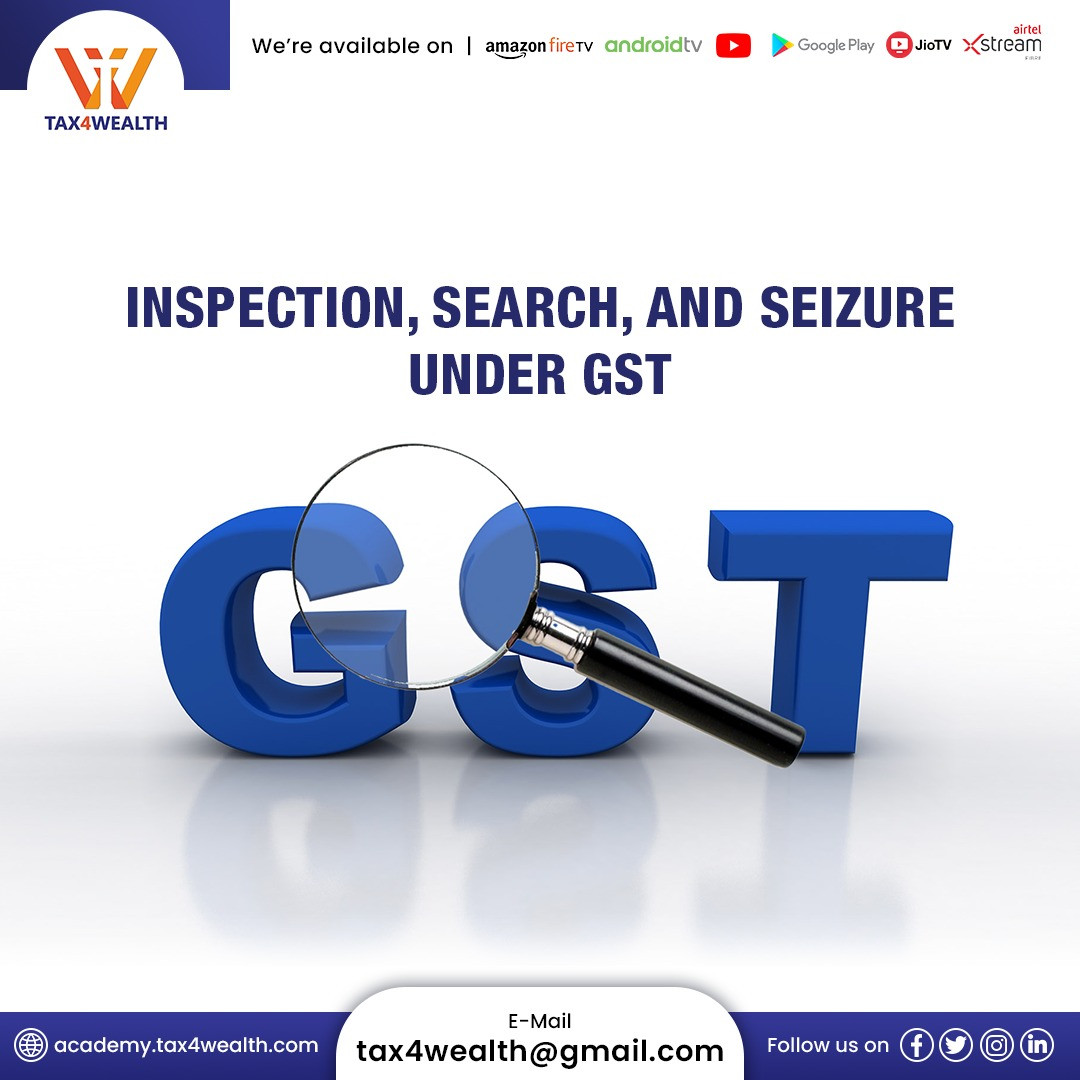
Inspection, Search and Seizure Under The GST
Introduction
According to the provisions of the Anti-Tax Evasion of Scheme of the Government of India, GST has also mandated strict guidelines for the inspection, search, and seizure of businesses involved in any sort of alleged tax evasion.
Inspection under GST
What is Inspection?
The term ‘Inspection’ refers to the act of examining something. In a legal context, it is regarded as not so hard provisions as compared to Search. It provides an opportunity to the relevant officer of GST to access the place of the business related to the taxable person or the place of business of any person related to transportation of goods who may be an owner or operator of a warehouse.
When Inspection under GST is made?
A Joint Commissioner of GST or any other Officer of Higher Rank under GST may have reasons to believe that with a view to evade GST by any person who has done the below-mentioned actions;
• Suppression of Stock-in-hand
• Suppression of transaction of supply if any
• Violated any of the provisions under GST
• excess claim of input tax credit
• Any supplier or operator or owner of the warehouse has stocked the goods in order to avoid taxes and maintain the books of account in such as manner that it will ultimately lead to evasion of taxes
Accordingly, the relevant officer has the authority to inspect the places of business in accordance with Form GST INS-10;
• Warehouse of the Owner of the Goods; or
• The taxable person's place of business; or
• The transporter's place of business; or
• Any other place in case the relevant officer may think fit to inspect
Analysis of the term "Reasons to Believe"
The term "Reason to Believe" refers to having either direct or indirect knowledge of facts and reality. This will make a reasonable person, know the facts to conclude the same accordingly. According to the provisions of the Indian Penal Code, 1860; a person will be termed to have "Reason to Believe" an action or thing if he gets sufficient and required amount of evidence and causes to believe that the evidence is genuine. Basically, the Reason to Believe is determined based on the evaluation and examination of intelligence. It is to be noted that it is more of a subjective concept, in other words, it can be called an opinion formed based on the facts instead of the interpretation of facts.
Importance of Reason to Believe
It is to be noted that the Goods and Service Tax Act does not specify the recordings of the facts for reasons of belief. However, the Finance Act 2017 has made an amendment under Section 132(1) & (1A) of the Income Tax Act, 1961 which states that the term "Reason to Believe" must not be disclosed to any authority or person or the Appellate Tribunal.
Search under GST
What is Search?
The term ‘Search’ refers to making an attempt to find something. In a legal context, it is a legal action taken by a Government Official including Police Officer, Tax Officer Etc. to go and check or examine the place, person or object carefully with regard to finding something crucial which is not disclosed or to conceal the evidenced to hide a crime. It is to be noted that a search can only be conducted by the order of a valid authority of law.
Who and when an order search under GST can be done?
Based on the results of the Inspection or any other evidence or reason, A Joint Commissioner of State Goods and Service Tax or Central Goods and Service Tax or Any Authorized Officer under GST can order to conduct a search, in case he has the following reasons to believe;
• If there are goods that are subject to confiscation.
• If any of the books of account or documents or other things that are useful at the time of proceeding are kept hidden somewhere to conceal the facts.
A Joint Commissioner of State Goods and Service Tax or Central Goods and Service Tax or Any Authorized Officer under GST can conduct a Search and seize the documents and goods discovered.
Seizure under GST
What is a Seizure?
The term ‘seizure’ is not specifically defined under the Goods and Service Tax Act. In a Legal Context, the term Seizure is termed as an act of taking over someone or something forcibly through the legal process. An example of a seizure can be evidence that is found at a crime scene. Generally, it implies taking forcible possession against the owner's wish.
Difference between Seizure and Detention
The terms seizure and detentions are different. The term "Detention" refers to not allowing access to the owner of the goods seized by a legal notice. However, in case of detention, the ownership of goods is still with the owner of the goods. Notice of detention is issued in case it is suspected that the goods are subject to confiscation.
On the other hand, Seizure refers to taking over the possession of goods of the owner by the legal authority who conducted the seizure process. However, in the case of Seizure also the ownership of goods is still with the owner of the goods. A seizure can be conducted after an investigation that the goods are subject to confiscation.
Form Required for Seizure
The relevant authorized officer will provide order with regard to seizure in Form GST INS-02.
What happens after the Seizure of Goods?
The following are some of the aspects that occur after a seizure;
• The person against whom the seizure was conducted, can make the copies of the document seized in the presence of the relevant officer
• In case the notice is not issued within 6 months, then it can be extended by another 6 months from the date of seizing of the goods, and then the goods will be returned to the owner.
• The Government can issue a list of hazardous goods that can be disposed of off soon after they were seized by the officers.
• All the seized goods will be listed properly by the seizing officer.
Application of Code of Criminal Procedure in such cases
In the process of both Search and Seizure, the provisions of the Code of Criminal Procedure will be applicable.
Other Means to Inspect
The Commissioner of GST or any other Authorized officer can buy the services and/or goods from a registered taxable person under GST. This can be done in order to check the authenticity of tax invoices issued and to analyze if the tax invoices are maintained correctly and the correct GST amount is displayed. In case the goods are returned, the amount will be refunded to the taxable person and the tax invoice will get canceled accordingly.
Powers of Searching Officer
The officer authorized to conduct the search has the power to seal the premises. Apart from that, if access is denied to the premises, then he can also break the doors of the premises. He can also break a box or cupboard in which any books, documents, and documents are kept which are suspected to be concealed.
What happens if it is impossible to seize the goods?
Sometimes, it is practically not possible to seize the goods. In that case, the authorized officer will order the owner of the goods not to remove the goods without his permission. Further, the authorized officer can also issue a prohibition order in accordance with Form GST INS-03.
Related News
No comments yet, Be the first to comment.













